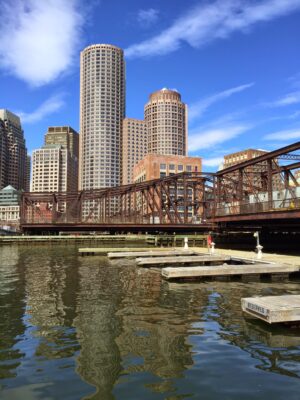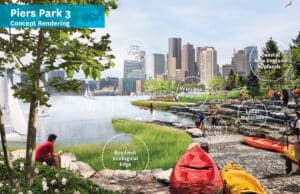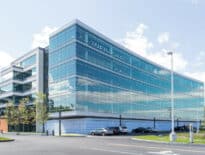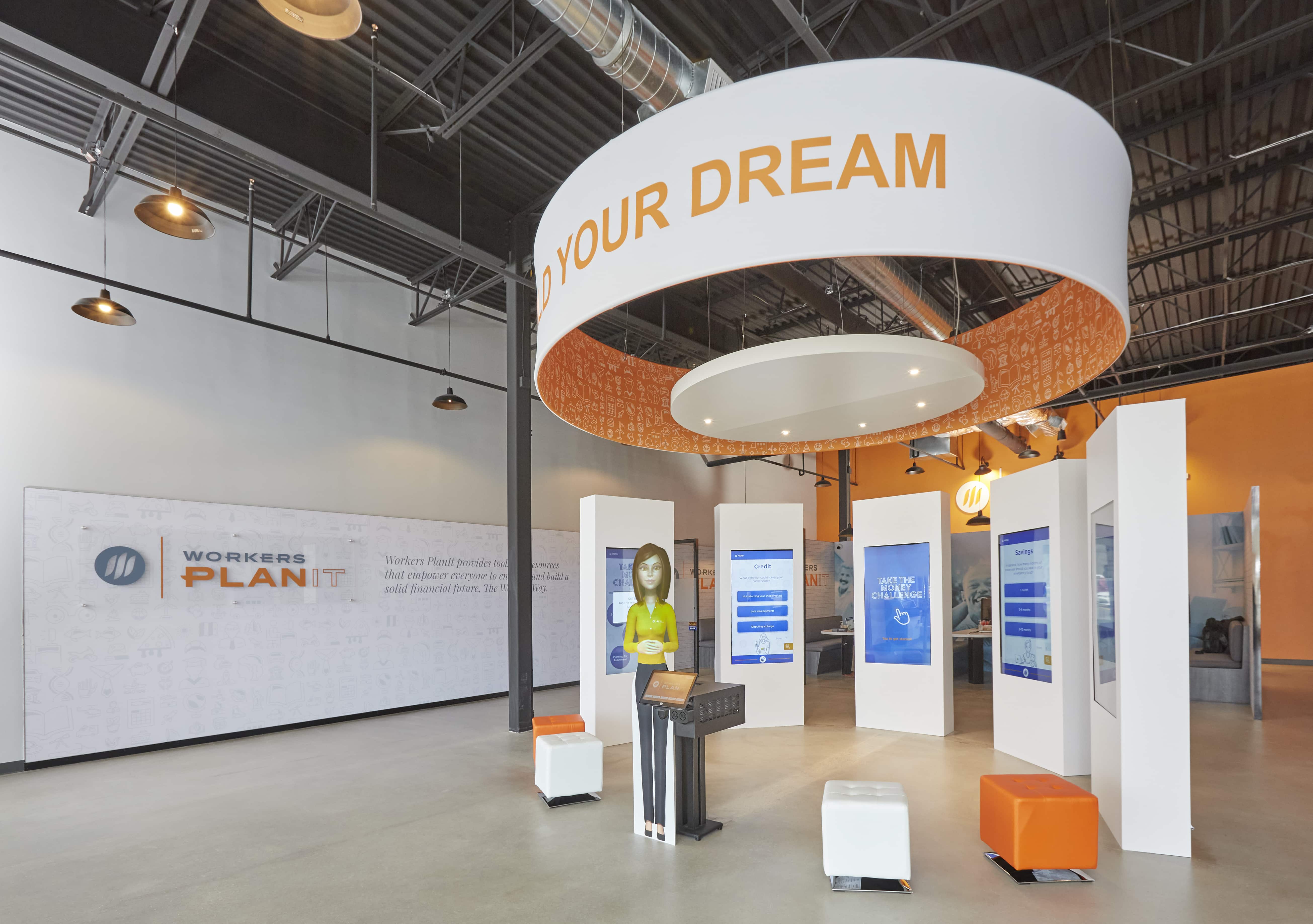
A recent survey of likely voters by MassINC found overwhelming support for more climate change development standards in Boston, and more public funding for resiliency projects. Photo by Steve Adams | Banker & Tradesman Staff
Boston’s upcoming mayoral election is shaping up as a litmus test for how the city handles waterfront development after a decade of explosive growth and deferred decisions about coastal resilience strategies and social equity.
Advocacy groups’ complaints about the Seaport District’s sparse public realm, lack of diversity and preponderance of high-end housing gained little traction in recent years. Following the departure of Mayor Marty Walsh, many of his potential successors fault the city for failing to ask more from developers.
The Coalition for a Resilient and Inclusive Waterfront, a new alliance of 40 nonprofits and environmental groups, is pushing its goals to the forefront of the mayoral race. Among the top priorities they’re asking candidates to address are improved public facilities, bringing a wider demographic of visitors to the waterfront and forming a clear strategy on resiliency planning.
“Ultimately our goal is to embrace the opportunity to create a world-class waterfront city,” said Kathy Abbott, CEO of environmental group Boston Harbor Now. “We’ve let that slip a bit, and the waterfront hasn’t been embraced yet by the entire city.”
Still looming is the question of who pays the estimated $4-billion bill to fortify coastal neighborhoods from East Boston to Dorchester against rising sea levels. Prospects for state and federal funding remain a key unknown, but private developers should be expected to pay a substantial portion, Abbott said.
“It’s got to be paid with public as well as private dollars. That’s a really important piece that a lot of us don’t want to talk about,” Abbott said.
A poll of 635 likely voters conducted in June by MassINC for the coalition found that 81 percent supported a set of climate change and community benefits standards for all developers building on Boston Harbor. Some 83 percent supported additional city spending on resiliency.
Beyond coastal defense strategies, the coalition is supporting expansion of recreational and cultural spaces for a diverse population of visitors.
“As future developments come along, the voices of BIPOC residents are the heart of future programming along the waterfront as it continues to evolve to be more inclusive,” said Christine Araujo, executive director of The American City Coalition, a Roxbury nonprofit group.

The Trustees of the Reservation are reviewing potential designs for the third phase of the Piers Park project in East Boston. A new coalition of 40 nonprofits and advocacy groups is asking Boston mayoral candidates to place a priority on improving public access and inclusive land use policies on the waterfront. Photo courtesy of Michael Van Valkenburgh Assoc.
‘The Wrong Type of Development’
The coalition’s advocacy comes as potential Walsh successors find faults with the largest potential waterfront project: The Chiofaro Co.’s proposed Pinnacle skyscraper on the Harbor Garage property.
Suffolk Superior Court Justice Brian Davis earlier this year overturned the Boston downtown waterfront municipal harbor plan that had cleared the way for the 600-foot-tall Pinnacle to seek final approval.
Even if the legal battle is resolved, the Pinnacle still requires final approval from the Boston Planning and Development Agency. Acting Mayor Kim Janey and several of the leading mayoral candidates have expressed strong reservations about the project.
Those complaints resurfaced last week during a hearing hosted by the state Department of Environmental Protection. State Rep. Adrian Madaro, D-1st Suffolk District, said the four-year planning process ignored potential effects on his district. MBTA Blue Line service to East Boston was disrupted by a 2018 coastal storm that flooded Aquarium station, next to the Pinnacle property.
“The city has been prioritizing the wrong type of development: exclusionary and high-end projects that do not provide public benefits and access, or climate resiliency in coming decades,” Madaro said.
District 1 City Councilor Lydia Edwards faulted the downtown waterfront planning process for lack of attention to social equity and affordable housing creation.
“The way the municipal harbor plan was done demonstrates we’re in two different worlds,” Edwards said. “There’s pre-pandemic Boston and the post-pandemic Boston. We’ve changed the way we think about our environmental justice. How many of these meetings were in more than one language?”
Seeking Expanded Parks and Diverse Vendors
The biggest immediate opportunity to expand public recreation on the harbor is taking place in East Boston. Coalition member Trustees of the Reservations and its landscape architect, Michael Van Valkenburgh Assoc., are drawing up several potential designs for the 4-acre abandoned pier owned by Massport. Unlike earlier stages of the project on neighboring piers, the goals include more active recreation uses and programming, said Nick Black, managing director of the Trustees’ Boston Waterfront Initiative.

Steve Adams
The Trustees have raised $20 million toward their $35-million fundraising goal, while seeking additional funding from public sources. The group hopes to select a final design by year’s end and begin construction as soon as late 2022.
A harbor cruise by 400 Roxbury residents last week was a snapshot of the potential for a more inclusive waterfront, and evidence of missed opportunities. The American City Coalition, a Roxbury nonprofit that seeks to improve economic prospects for residents of low-income neighborhoods, partnered with Boston Harbor Now on the event.
The event was a demonstrated the potential for connecting residents of outlying Boston neighborhoods with the waterfront, as well as missed opportunities for an inclusive Seaport, said Araujo, executive director of The American City Coalition. In the MassINC poll, only 38 percent of likely voters said existing waterfront activities reflect the city’s racial diversity.
“I took a walk around the neighborhood and I keep thinking, ‘What’s drawing me here? What would keep me here?’” Araujo said, mentioning potential attractions such as an artist cooperative or independent bookstore. “We’re looking to expand the retail options for people of color.”






